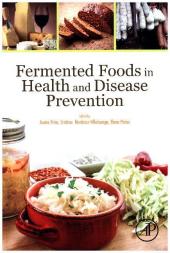 Neuerscheinungen 2016Stand: 2020-02-01 |
Schnellsuche
ISBN/Stichwort/Autor
|
Herderstraße 10
10625 Berlin
Tel.: 030 315 714 16
Fax 030 315 714 14
info@buchspektrum.de |

Juana Frías, Cristina Martínez-Villaluenga, Elena Pe¤as
(Beteiligte)
Fermented Foods in Health and Disease Prevention
Herausgegeben von Frías, Juana; Martínez-Villaluenga, Cristina; Pe¤as, Elena
2016. 762 S. 276 mm
Verlag/Jahr: ACADEMIC PRESS 2016
ISBN: 0-12-802309-0 (0128023090)
Neue ISBN: 978-0-12-802309-9 (9780128023099)
Preis und Lieferzeit: Bitte klicken
Fermented Foods in Health and Disease Prevention is the first scientific reference that addresses the properties of fermented foods in nutrition by examining their underlying microbiology, the specific characteristics of a wide variety of fermented foods, and their effects in health and disease. The current awareness of the link between diet and health drives growth in the industry, opening new commercial opportunities.
Coverage in the book includes the role of microorganisms that are involved in the fermentation of bioactive and potentially toxic compounds, their contribution to health-promoting properties, and the safety of traditional fermented foods. Authored by worldwide scientists and researchers, this book provides the food industry with new insights on the development of value-added fermented foods products, while also presenting nutritionists and dieticians with a useful resource to help them develop strategies to assist in the prevention of disease or to slow its onset and severity.
Provides a comprehensive review on current findings in the functional properties and safety of traditional fermented foods and their impact on health and disease prevention
Identifies bioactive microorganisms and components in traditional fermented food
Includes focused key facts, helpful glossaries, and summary points for each chapter
Presents food processors and product developers with opportunities for the development of fermented food products
Helps readers develop strategies that will assist in preventing or slowing disease onset and severity
Section 1. Introduction 1. Fermented Foods in Health Promotion and Disease Prevention: An Overview
Section 2. Fermented Foods as a Source of Healthy Constituents 2. Bioactive Peptides in Fermented Foods: Production and Evidence for Health Effects 3. Health Benefits of Exopolysaccharides in Fermented Foods 4. Biotransformation of Phenolics by Lactobacillus plantarum in Fermented Foods 5. Gamma-Aminobutyric Acid-Enriched Fermented Foods 6. Melatonin Synthesis in Fermented Foods 7. Effect of Fermentation on Vitamin Content in Food 8. From Bacterial Genomics to Human Health
Section 3. Traditional Fermented Foods Section 3.1. Fermented Food of Animal Origin 9. Fermented Seafood Products and Health 10. Fermented Meat Sausage Section 3.2. Dairy Fermented Foods 11. Health Effects of Cheese Components with a Focus on Bioactive Peptides 12. Blue Cheese: Microbiota and Fungal Metabolites 13. Yogurt and Health 14. Kefir Section 3.3. Legume and Cereal Grains Fermented Derived Products 15. Beer and Its Role in Human Health 16. Fermented Pulses in Nutrition and Health Promotion 17. Nonwheat Cereal-Fermented-Derived Products 18. Use of Sourdough Fermentation and Nonwheat Flours for Enhancing Nutritional and Healthy Properties of Wheat-Based Foods 19. Tempeh and Other Fermented Soybean Products Rich in Isoflavones Section 3.4. Vegetables and Fruits Fermented Products 20. Kimchi and Its Health Benefits 21. The Naturally Fermented Sour Pickled Cucumbers 22. Role of Natural Fermented Olives in Health and Disease 23. Pulque 24. Sauerkraut: Production, Composition, and Health Benefits 25. Vinegars and Other Fermented Condiments 26. Wine
Section 4. Hazardous Compounds and Their Implications in Fermented Foods 27. Biogenic Amines in Fermented Foods and Health Implications 28. Occurrence of Aflatoxins in Fermented Food Products 29. Antibiotic Resistance Profile of Microbes From Traditional Fermented Foods
Section 5. Revalorization of Food Wastes by Fermentation into Derived Outcomes 30. Fermentation of Food Wastes for Generation of Nutraceuticals and Supplements


